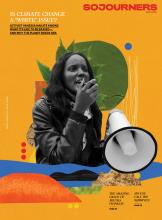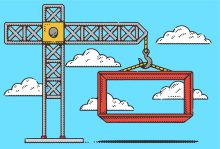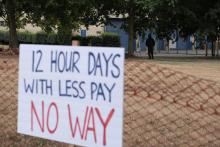supply chain

AT THANKSGIVING, MILLIONS of us across the country gather around tables. Gratitude will be expressed for blessings both great and small, which indeed is an opportunity to trace the goodness that enfolds our daily lives. Gratitude is one of the more ancient practices of our human society. It has long been observed across different religions, researched in the field of psychology, and mused over by philosophers. Orator and philosopher Marcus Tullius Cicero wrote, “Gratitude is not only the greatest of virtues, but the parent of all others.”
One of my most formative perspectives on gratitude comes from Indigenous practice. Indigenous cultures in the Americas have observed collective practices of gratitude that have long preceded our legislated day of thanks. The Haudenosaunee Confederacy, also known as the Iroquois or the Six Nations, have a daily Thanksgiving Address recited by school children just before classes begins. This is a practice author Robin Wall Kimmerer calls “an allegiance to gratitude.” The address uses gratitude to trace life-sustaining provision to the Creator, to the community, and to every food and water source, through every plant, every creature, and even the land itself. Gratitude is essentially ecological this way.

Activist Vanessa Nakate on Jesus, erasure, and the climate crisis in the Horn of Africa.

BY NOW, MOST of us have been affected by problems with the “supply chain.” It started last year with shelves void of toilet paper, then morphed into a lack of other manufactured goods, including construction materials, cars, and medical equipment.
Other than this being a (sometimes serious) nuisance, why should people of faith take notice? From our perspectives—as a theologian and a developer of worker-owned cooperatives—the broken supply chain throws light on some of our deepest economic and political problems.
The current shortage of goods and services is often attributed to the COVID-19 pandemic. Its roots, however, are in an economic system designed to produce maximum profits for the few rather than the many by outsourcing production. The “few” are called shareholders and the “many” are those who work for a living. While many working people also own some shares, the bulk of profit in this system goes to those with the largest portfolios and majority positions. No wonder U.S. billionaires have gained more than $2 trillion since the pandemic began.

The latest headlines are filled with news of worker shortages, delayed supply chains, and labor strikes. Cornell University’s School of Industrial and Labor Relations strike tracker reports more than 181 strikes so far this year, with 38 of them taking place in the first two weeks of October, spurring the AFL-CIO to name this month “Striketober.” These strikes span all kinds of industries, from hospital workers to whisky makers.

Your neighbor is every man woman and child who touched the supply chain used to make your cell phone, used to make the clothes you wear, the computers you type on and the cars you drive.
Your neighbors are all of God’s children. The theological reality that people of faith try to live out is that our neighbor is not defined by geographical proximity. Our neighbor is the person in need.
Sometimes, caring for our neighbor means a change of plans. Sometimes, caring for our neighbor means we have to slow down a little bit. Sometimes, caring for our neighbor might even cost us money.
There are people who haven’t wanted to get involved in the mess by the side of the road. They walk by it and say that it’s somebody elses responsibility. My job, they say, is at the end of the road at Jericho. I’m just being faithful to my shareholders by maximizing profit. My job is just getting the products people want into the hands of those that want them. I can’t be worried about those who get left by the side of the road of my supply chain. If I stop to help clean up the mess along the way it might cost time and money.